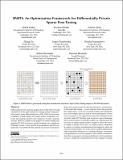| dc.contributor.author | Makni, Mehdi | |
| dc.contributor.author | Behdin, Kayhan | |
| dc.contributor.author | Afriat, Gabriel | |
| dc.contributor.author | Xu, Zheng | |
| dc.contributor.author | Vassilvitskii, Sergei | |
| dc.contributor.author | Ponomareva, Natalia | |
| dc.contributor.author | Mazumder, Rahul | |
| dc.contributor.author | Hazimeh, Hussein | |
| dc.date.accessioned | 2025-09-09T19:57:11Z | |
| dc.date.available | 2025-09-09T19:57:11Z | |
| dc.date.issued | 2025-08-03 | |
| dc.identifier.isbn | 979-8-4007-1454-2 | |
| dc.identifier.uri | https://hdl.handle.net/1721.1/162621 | |
| dc.description | KDD ’25, Toronto, ON, Canada | en_US |
| dc.description.abstract | Differentially private stochastic gradient descent (DP-SGD) is broadly considered to be the gold standard for training and fine-tuning neural networks under differential privacy (DP). With the increasing availability of high-quality pre-trained model checkpoints (e.g., vision and language models), fine-tuning has become a popular strategy. However, despite recent progress in understanding and applying DP-SGD for private transfer learning tasks, significant challenges remain - most notably, the performance gap between models fine-tuned with DP-SGD and their non-private counterparts. Sparse fine-tuning on private data has emerged as an alternative to full-model fine-tuning -- recent work has shown that privately fine-tuning only a small subset of model weights and keeping the rest of the weights fixed can lead to better performance. In this work, we propose a new approach for sparse fine-tuning of neural networks under DP. Existing work on private sparse finetuning often used fixed choice of trainable weights (e.g., updating only the last layer), or relied on public model's weights to choose the subset of weights to modify. Such choice of weights remains suboptimal. In contrast, we explore an optimization-based approach, where our selection method makes use of the private gradient information, while using off the shelf privacy accounting techniques. Our numerical experiments on several computer vision models and datasets show that our parameter selection method leads to better prediction accuracy, compared to full-model private fine-tuning or existing private sparse fine-tuning approaches. Our code is available here: https://github.com/mazumder-lab/SPARTA/tree/main | en_US |
| dc.publisher | ACM|Proceedings of the 31st ACM SIGKDD Conference on Knowledge Discovery and Data Mining V.2 | en_US |
| dc.relation.isversionof | https://doi.org/10.1145/3711896.3736842 | en_US |
| dc.rights | Creative Commons Attribution | en_US |
| dc.rights.uri | https://creativecommons.org/licenses/by/4.0/ | en_US |
| dc.source | Association for Computing Machinery | en_US |
| dc.title | SPARTA: An Optimization Framework for Differentially Private Sparse Fine-Tuning | en_US |
| dc.type | Article | en_US |
| dc.identifier.citation | Mehdi Makni, Kayhan Behdin, Gabriel Afriat, Zheng Xu, Sergei Vassilvitskii, Natalia Ponomareva, Rahul Mazumder, and Hussein Hazimeh. 2025. SPARTA: An Optimization Framework for Differentially Private Sparse Fine-Tuning. In Proceedings of the 31st ACM SIGKDD Conference on Knowledge Discovery and Data Mining V.2 (KDD '25). Association for Computing Machinery, New York, NY, USA, 2090–2101. | en_US |
| dc.contributor.department | Massachusetts Institute of Technology. Operations Research Center | en_US |
| dc.contributor.department | Sloan School of Management | en_US |
| dc.identifier.mitlicense | PUBLISHER_POLICY | |
| dc.eprint.version | Final published version | en_US |
| dc.type.uri | http://purl.org/eprint/type/ConferencePaper | en_US |
| eprint.status | http://purl.org/eprint/status/NonPeerReviewed | en_US |
| dc.date.updated | 2025-09-01T07:50:30Z | |
| dc.language.rfc3066 | en | |
| dc.rights.holder | The author(s) | |
| dspace.date.submission | 2025-09-01T07:50:31Z | |
| mit.license | PUBLISHER_CC | |
| mit.metadata.status | Authority Work and Publication Information Needed | en_US |
